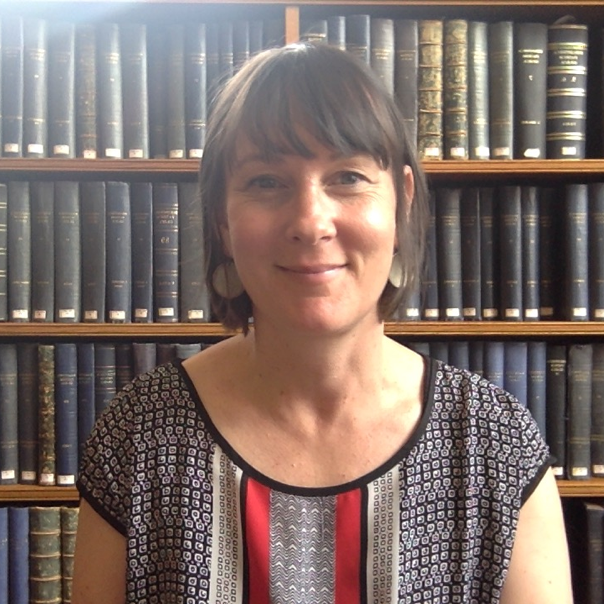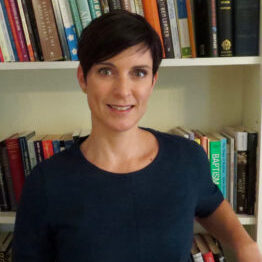Episode Transcript
[00:00:08] Speaker A: You're listening to by the well, a lectionary based podcast for preachers with Fran Barber and Robin Whitaker.
[00:00:21] Speaker B: Hello, everyone. Robin here. And today Fran is taking a day off and I am joined by our friend and colleague, the Reverend Dr. Sally Douglas. Welcome, Sally.
[00:00:31] Speaker C: Hi, it's lovely to be here.
[00:00:33] Speaker B: And we're doing something a bit different today. This is a special bonus episode, as we like to call them, where we're just going to spend 25 to 30 minutes getting into Mark's gospel. It's the year of Mark. We're going to do a quick kind of intro to mark 101 in 25 minutes and condense what is normally a semester's worth of teaching for us. We're going to try at least. But let me tell you something about Sally. Sally is a uniting church minister at Richmond. She is also one of our associate faculty here at Pilgrim Theological College, where she teaches in the areas of New Testament, early christian literature and theology.
And she's author of a book called early Christian Understandings of Jesus as the female divine, amongst other things. What are you working on at the moment, Sally?
[00:01:19] Speaker C: Well, I've got several projects, but in the coming months I've got a new book coming out. Yeah, it's exciting. So it's not a highly, highly academic book, it's for popular level reading and it's addressing that issue of church decline and why I don't actually think that's happening. And it's called, yeah, the church assault, becoming the community Jesus speaks about.
[00:01:42] Speaker B: Oh, fantastic.
[00:01:43] Speaker C: Yeah, I'm really excited. So, early church, New Testament, early church writers and engaging with some contemporary contexts as well.
[00:01:49] Speaker B: Fantastic. Well, I'm just saying it now publicly. We'll have to get you back to talk more about that at some stage, but it's not our topic today.
[00:01:56] Speaker C: Not in Mark? Oh, a little tiny bit in Mark later, but, yeah, not central, not much. Yep.
[00:02:00] Speaker B: No, that's good. So let's get into Mark and start with the sort of who, what, when there, who wrote it, where, for whom, what do we know?
[00:02:08] Speaker C: Yeah, not a lot, but it's great to dive in. I love Mark's gospel for so many reasons. So one of the things we do know is that it's probably the earliest gospel that we have, and I think there's some really gorgeous indications of that within the text that point us to that. So we don't know who wrote it. We can argue about where it was written or for what community, but there are these gorgeous little hints. So, for example, I just love at the very end, towards the end of Matt's gospel, Jesus is on the way to the cross and Simon's carrying the cross, and the author just stops and says, that's Rufus and Alexander's dad.
[00:02:42] Speaker B: Yeah.
[00:02:43] Speaker C: And so whoever the author is and whoever they're writing to, they assume that they all know who Rufus and Alexander are. It's like, oh, yeah, we know them.
[00:02:51] Speaker B: Yeah.
[00:02:51] Speaker C: And the other gospels drop that out because who we don't know Rufus Alexander. So it just gives us that immediacy sometimes in Mark, which isn't there in the same way as perhaps in the other gospels. So there are these really gorgeous. There are more, but they're really gorgeous hints about it being early and it's on the go. It's very fresh.
[00:03:12] Speaker B: It is very dramatic. Yes. The word immediately appears so all over the place, and then Jesus did this and then they were there. So it does have that. It's also one of my favorite gospels, too. I think you and I are aligned on mean. The scholarly consensus is it's the earliest gospel, or at least the earliest one we have so far. As far as we know.
Certainly Matthew and Luke draw heavily on it. Yes.
[00:03:39] Speaker C: And do all kinds of smoothing for their own agendas.
[00:03:43] Speaker B: Yes. So there's a kind of a rawness isn't perhaps quite the word in Mark, because I also think it's highly literary and very carefully.
[00:03:56] Speaker C: But maybe in that rawness thing, it's more blunt. So in the other gospels, in various conversations, the disciples are really quite pious and they've got it together a little bit more where in Mark, for whatever reason, the author chooses not to do that, they just say stupid things over and over again. And there's this kind of humor lilting through it as well with some of those conversations. So that doesn't mean that it's not as sophisticated. Maybe it means it's a bit more honest. I don't know. There's different ways of interpreting that, I think.
[00:04:25] Speaker B: And we'll probably circle back to discipleship because that's a key theme. And Mark has that particular way of portraying the disciples as just pretty clueless, really. It's very heartening.
But let's start with what are the mark and themes that really stand out to you when you think of Mark?
[00:04:42] Speaker C: Look, I think one of the first and most important themes is quite confronting for us in contemporary western context. It's cosmic forces. So the whole gospel is set in this end. The world is not neutral for the author and for the community that the author is writing to. Cosmic forces are real and they are destructive and Jesus, in coming among the people as the holy one. And the first thing that Jesus does after calling the first supper, know liberation from cosmic evil, this unclean spirit, the spirit recognizes who Jesus is. You're the holy one, and it's all about liberation from this. So it's spreading the reign of God in a way that is not just like, oh, isn't that nice? It's disrupting the reign of evil. Like, there's a tension in the text the whole time. What we do with that is another question. But we have to be honest. I think about going, well, this is the worldview in this community. We need to read it at least through that lens. Whether we agree with it or not is another thing entirely, but we need to acknowledge it as really present and really central.
[00:05:44] Speaker B: I agree the language of demons and things is very uncomfortable for a lot of us in more liberal mainstream church traditions. But it's there in the text. It's a worldview. I mean, demons in Christianity became associated with evil, but the word demon just means spirit. And there could be good and bad spirits, and they're.
[00:06:02] Speaker C: Exactly, exactly. Can I just do this shout out? Because I think it can be so hard for us to get heads around it. There's this fantastic docko by the same director who did Samson and Delilah, indigenous director Warwick Thornton. And it's called the dark side, and it's got all these really fantastic australian actors in it. And some of them are telling the stories of other people, other indigenous people. And some of those indigenous people are telling their own stories about experience of spirits. And some are evil, some are comforting, some are people who have died and returned. And I just think it's a beautiful reminder of this is how most people around the world thought not that long ago. Like this western assumption that it's all ridiculous or all is dismissive of it. Yeah, it's like 100 years old or so, that view. I'm not saying it's not right or wrong. We need to think a bit more expansively, and I think our indigenous brothers and sisters can teach us a lot about this. So it's a great docker to look into the ducks.
[00:06:59] Speaker B: Fantastic. We'll put that in the show notes so people can find a link to it.
You've just reminded me, like, again, our western centric readings want to go to the scientific and the rational, and the text keeps drawing us into a wider, different way of seeing the world.
So to be so dismissive of kind of that our experience of the world has this spiritual dimension is both. It's problematic in all sorts of ways, but it's so dismissive of other cultures. That is how they explain.
But I mean, the work of preachers is obviously to do some of that translation, I think we need to be careful, and this is a bit off topic of mark, but we need to be so careful that when we then use the language of the text of unclean spirits or demons, we aren't conflating it with mental illness or certain things in ways that are actually deeply problematic.
[00:07:51] Speaker C: Exactly. Particularly as there'll be possibly some people in our corinthians who've been told that by someone that they have an unclean spirit or so on. But I think that also invites us into a wider view about the collective energy, if you like. That can happen because, for example, the white supremacy stuff that we've seen in the United States of America, the collective power of lies and deception and the way in which that is producing violence, I think the language of evil spirits is kind of helpful. I'm not saying that people are possessed, but there's an energy that's bigger than the individuals that are part of it.
[00:08:27] Speaker B: Yes.
[00:08:27] Speaker C: And it can possess like people have been possessed by this kind of whole.
[00:08:33] Speaker B: Caught up in it.
[00:08:34] Speaker C: Caught up in it. So I think reclaiming and as you say, really carefully and with nuance and bringing those wrestling questions to the table as well. But it's really important for us potentially to engage with those notions and metaphors and symbols still, because there's a truth there.
[00:08:50] Speaker B: There is a truth, and particularly about the collective nature of evil. And when these sort of evil forces, if you want to call them that, bind together, we see in systemic racism and other systemic sexism, they are the opposite of the liberation. So you started with Jesus liberates from. Yes, I think of Mark as the Jesus is the exorcist gospel.
[00:09:13] Speaker C: Yeah. Amen. Amen. It's that liberation from. And so then the invitation, rather than us fixating on, well, what exactly happened and what do we believe about that? I think the much more important question in contemporary context, I mean, we can engage with those questions, that's fine. But is do we have a heart conviction that Jesus continues to liberate in our own contexts and to cast out evil, to name evil and cast it out?
And if we do, what does that mean for how we live and how we respond to evil and how we name evil and so on?
Then it gets super exciting and kind of links in with those questions around discipleship.
[00:09:51] Speaker B: Definitely. And I mean, for me, that's one of the reasons why Mark is such a great gospel to preach, because I think there's all sorts of ways it speaks to ongoing contemporary issues, even though it's 2000 years old.
[00:10:04] Speaker C: Oh, I agree totally.
[00:10:09] Speaker B: You, I'm sure, have lots of other themes. One of the themes in Mark for me is also the cross, which directly relates to what everything we've just said. The cross is the liberation point, but there's something about suffering in Mark that's difficult and challenging, I think.
[00:10:25] Speaker C: Well, yeah. So can we dive in here? Because I think this is so exciting. So the way in which the gospel builds up with this don't tell anyone, don't tell anyone, don't tell anyone who I am.
And then this kind of revelation of Peter finally going, oh, you're the messiah, but then freaking out entirely when Jesus says, well, yeah, I'm going to suffer. So that question of suffering is so central.
Then the chapters that follow on from that eight and nine and ten, it's all about them trying repeatedly, like three times. Is it recorded? But you get the sense that it's a bigger conversation of how, yes, I'm the messiah, but I'm the one who inverts power, like I invert understandings of power. So I am the God, one who gives self away. So it's not this glorification of suffering. And there's not a sense in Matt's gospel that it's an atonement, really. It's much more about this is the one who comes to, I've. I've come to serve you. And so it entirely upends our constructs of God. If, like the disciples, you think the God one's going to be about glory, glory, glory, and I'm going to sit.
[00:11:25] Speaker B: On your right hand and might and.
[00:11:27] Speaker C: All of those things are undone and in such provocative and powerful ways.
So it does invite us into suffering. But from the perspective of who the author of Mark understands Jesus to be, and Jesus is the one with authority, authority over evil, authority to teach, authority to heal, authority to forgive. He is the God one.
So then all our images of God just get undone.
[00:11:51] Speaker B: Yes. And what authority even looks like gets undone, that somehow this paradoxical entering into the very space of death and death as a cruel and punitive tool of the roman empire to smash down anyone who spoke out against them or challenged their authority, becomes the very point of liberation.
[00:12:14] Speaker C: What paradox, what beauty?
[00:12:16] Speaker B: I know there's a great book I used in class last year by an american author called Raquel St. Clair.
I think it's called call and consequence, where she talks about suffering and Mark and her experience as a minister. She's african american in an african american communities. And I mention it here because, again, flagging the problems, the problem when we talk naively about suffering can be to leave people in suffering or to know, worst case scenario, you hear these horror stories of women being told, well, it's your cross to stay in an abusive relationship. So she really unpacks that and challenges it and talks about suffering. And Mark is suffering for Christ. And with Christ, it is not any of those other things that we should actually be fighting to liberate people from precisely because of the gospel.
[00:13:05] Speaker C: And also those calls in Mark's gospel are situated in a context in which those first readers and hearers, if they choose to go this way of Jesus, will likely cause attention from the roman empire and possibly suffer. Like there are some very literal, as in there were the consequences.
[00:13:22] Speaker B: Yeah, very real consequences.
[00:13:23] Speaker C: Very real consequences. And in parts of the world, clearly not in the west, but in parts of the world, that is still the case in Iran and other places. If you choose to leave Islam and become a Christian, that's a life and death situation. But for us to, then it's just appalling when we do these numbers on the text, take them entirely out of context and then justify violence. And it's just deeply ironic because Jesus is the one who absorbs the violence and know this is not the way of God and calls us into this liberation from violence.
[00:13:49] Speaker B: Yeah, exactly.
So then we've unpacked the cross and of know the other thing just to bring it down to very basics. In Mark, we don't have the infancy story. We also don't really have a resurrection story, certainly not an account, not a visual encounter. So we get left with this confronting ending of an empty tomb and frightened people. And frightened people who are being sent back to Galilee. This is the bit of Mark I love. He commissions the women to tell the male disciples, yes, so women are there central first apostles, but to tell the men to return to Galilee and meet Jesus there. And there's a sense that the story begins again, so that discipleship is to go back to Galilee and kind of start again and maybe this time you'll get just a little bit more, which.
[00:14:39] Speaker C: Is so perfect because of that pattern in Mark where Jesus keeps telling them again and again and again. And there's these beautiful know. Did you not understand about the bread yet? And they're like, why is he talking about, like, there's this constant kind of. You need to hear this again. And then that's all of us. We need to come back to this again. And I love that ending, too. So people may or may not be aware that there's a shorter ending that's seen as part of the manuscript, and it ends just with this cliffhanger of the women are terrified.
You would be terrified. Like, that's a perfectly understandable response. You've just seen this person killed by the state in the most agonizing way, and now what?
[00:15:18] Speaker B: Where's he gone? And there's some slightly angelic looking young man maybe telling you he's gone. And you're like, what do you mean?
[00:15:28] Speaker C: So I love that authenticity of this gospel. Yeah.
[00:15:32] Speaker B: It is the gospel of, as you said before, kind of human frailty and realness. Not these pious super christians. These are people figuring it out.
[00:15:41] Speaker C: One other thing that really, this is the reading coming up this Sunday, one of the many, many delights of Mark is that it's a very, very different understanding of discipleship at the very beginning, I think because Jesus calls the disciples and they leave the nets and follow. But then a few verses later, they go home for tea. Yes. They go back to Peter's house and his wife's mum is sick.
[00:16:04] Speaker B: Yeah.
[00:16:05] Speaker C: And so whatever. Leaving the nets. And Jesus doesn't say, leave everything in Mark. It's just know, come follow me. So they leave the nets and leave the dad. It doesn't mean neglecting your family or your relationships or your community and walking away. It's a really different understanding. It's instead about inviting Jesus into the community, into the family, and Jesus doesn't go, who cares that your mum in law is sick? Like he sees and responds. So it's about Jesus meeting people in the midst of the chaos and the mess and the joy and the suffering of family. So it's a very different understanding of discipleship in Mark. And I think that's quite intentional. And then Luke flips it. He can't cope. So Peter's mum's healed first, then there's a know. It's much more, and they leave know. It's a very different understanding. And I would argue, potentially patriarchal know justify leaving care of family to other.
[00:17:00] Speaker B: You know, from what we know of the ancient world, if the men of the home who earned the money left you are potentially leaving a home in absolutely dire straits.
[00:17:09] Speaker C: And so vulnerable. Yeah, exactly.
[00:17:11] Speaker B: And why widowed women were vulnerable and unwed girls were vulnerable.
[00:17:15] Speaker C: Exactly.
[00:17:16] Speaker B: Have a father or a brother or a husband to look after you in a structure where economically, that's how it yeah.
[00:17:23] Speaker C: And Mark doesn't do that. They go home and then again and again, the conversations are at the house. At the house.
[00:17:29] Speaker B: And then we know some of those women were on the road all the way to the cross.
I love that you've pointed that out because I think that is striking in Mark. And it goes to Mark's use of hyperbole, too, because in that same know, he's healed a few people and then the whole town is at the door. So when we read the immediately and this and whole crowds, and he's capturing the drama, it's a little bit hyperbolic in places, but he wants us to know something was happening. This was unusual. But the ministry starts local. They go around these local towns before they do, expand to the gentiles and then end up in Jerusalem and continuing.
[00:18:10] Speaker C: To speak of this energy of God. I think that's sometimes more helpful. Language or reign of God, force of God, whatever, that disrupts the powers of death and violence and evil and power over entirely disrupts those. Yep.
[00:18:24] Speaker B: So while we're sort of still on discipleship, Mark has that very confronting version of the if you would be one of my disciples, pick up your cross and follow me. Which again, Luke softens with a pick up your cross daily, which, of course, immediately makes it a metaphor, not a literal thing. Do you think that's literal in how.
[00:18:46] Speaker C: I think the author of Mark is being the Jesus in Mark is being really honest, but this cost is costly and you could get killed. Like sort of the opposite of most models of leadership now, where it's like, follow me and we'll make wherever great again, or everything's going to be like, it's such an amazing disruption of that kind of construct. It's actually going to be really hard. And you could be like, there's some great work that's been done talking about the context at the time that you could be kicked out of your family if you were following Jesus or out.
[00:19:18] Speaker B: Of your work, out of your synagogue.
[00:19:20] Speaker C: Out of your synagogue, out of the safety of if the state's starting to look at you. And also in the greek or roman context, too. So not just within the jewish context, but if you're becoming a Christian and then you're not making sacrifices to Zeus or to Apollo or the other gods, there was this increasing fear that you're going to bring these gods'anger on us and our towns going to get smited. If you read Justin Martyr and others, people are hurling abuse at christians for being pagans because they won't do all these liturgies and sacrifices to the local greek and roman gods. And the fear was literal that towns would be smashed as a consequence of knowing these gods. So if you're getting hostility from all these places, death is a possibility.
And that argument about whether death has really said that or not, because it's unlikely, I think that's a really hard argument to pin down because Jesus said so many unlikely things, that's not a sufficient reason to go, oh, well, he couldn't have said that. Who knows? I think that there was clearly a sense of, this is dangerous. You need to know upfront before you join that it will be costly. Yeah.
[00:20:28] Speaker B: What else strikes you? So we've touched on discipleship, the demon cosmic aspects of the text, death and the cross. I wonder about christology, which was kind of touched on in these conversations. Let's go. Is there anything else you want to say christologically about the way Mark portrays Jesus?
[00:20:51] Speaker C: I would really like to, because there's a quite popular view in some circles that Mark has a really low christology, because there's no virgin birth narrative or there's no epic poem like the beginning of John's Gospel. And I think that's a really problematic argument because again and again, the central emphasis is that Jesus is the one with authority. And it's not just any authority, it's the authority that God has. So that notion to be able to forgive sins is what God does and Jesus does that. And to have authority over cosmic evil means you must have some kind of cosmic power. Cosmic good. For the Star wars fans, this is the kind of imagery that's going on here about forces against one another, which.
[00:21:31] Speaker B: Is why there's that weird thing about Beelzebub, because it's like, who else has the power over these demons?
[00:21:38] Speaker C: Exactly.
[00:21:38] Speaker B: If you're not a demon yourself or God, which is a problem.
[00:21:45] Speaker C: People do all these kind of gymnastics around, what does son of God mean? Or son of man? Yeah, I mean, that's an interesting question, but I'm not that fussed, really, because that's not the heart of the christological argument in Mark's gospel. The heart of the christological argument is that Jesus has authority as the God one to heal, to cleanse, to liberate, to teach, and to calm nature as well, like calm the winds and everything.
[00:22:11] Speaker B: I was just going to say that the calming of the storm and the walking on water are classic apocalyptic ways of describing control over nature, the chaotic forces of nature, which is a parallel to the exorcisms.
[00:22:26] Speaker C: It is. And there's some who would argue that there's imagery of wisdom within that Sophia woman wisdom? There may be. I think there's some really interesting and particularly because there's this gorgeous stuff in Mark where after the feeding narratives that's the revelation of who Jesus is. They didn't notice about the bread, the author says. So it's not. Didn't notice that he liberated someone from cosmic evil and didn't notice that he raised someone or whatever they didn't understand about the bread that fills. So this is the go one who among everything else, like for the author that's really central, that this is the one who nourishes to filling to complete.
You know, it could be that wisdom imagery is in the background as well, but there's a central aspect in which Jesus is the goal and whether that's just in the baptism before again, an interesting conversation. I think there are different views about that, but regardless.
[00:23:28] Speaker B: You'Re seeing a pretty high christology.
No, I agree. And I think for me the Son of God in the very first line is part of setting that up, but then subverting it because it's like, yes, son of God. He has the authority over all the things you've just named, but then he will go to the cross and we'll talk in chapter ten about the son of man came not to be served, but to serve. That's right. So subverting what son of God looks like in terms of being in the world and what the nature of how.
[00:23:58] Speaker C: That God liberates and the nature of the kingdom, that means it's the serving kingdom and the nature of discipleship, which means we're called into it, which also then ties back to Peter's mum in law. She's the model disciple. Like, she receives this liberation and then she gets up and we can argue that it's just another woman being missus. And that's a legitimate argument. But I think there's something more interesting going on. There is like, Peter doesn't get it. James and John want to be on either side as the heroes, but she gets up and does what Jesus does.
[00:24:26] Speaker B: Which is to serve or minister, which is exactly what he talks about his own ministry being.
[00:24:32] Speaker C: Yeah.
[00:24:36] Speaker A: If you're enjoying by the well, please take a moment to review us wherever you listen to podcasts.
[00:24:45] Speaker B: Do we need to talk about women or any other things in Mark? I feel like there's not a lot of women, but there's a couple of subversive moments.
[00:24:54] Speaker C: There are. And there's some really. So people may find problematic Jesus conversation with woman from another context and the imagery of the dogs and the children.
[00:25:07] Speaker B: In that phoenician story.
[00:25:09] Speaker C: But there's really amazing stuff that happens within that, around Jesus'mind is changed through that.
And, and this is where we need to have a really much more sophisticated and robust understanding know, truly human, truly divine, fully human, fully divine. But in that moment of realizing, oh my goodness, the kingdom is primarily for Israel, but extended beyond Israel, then going on to have the second feeding narrative, possibly in a gentile area, and it's this gorgeous, I mean, it's so beautiful. So this one woman transforming Jesus, what he's brought up culturally and in a patriarchal context as well, in religious context, to have his mind blown in that way and then extend the feast is just astonishing. So the women who are there are important and powerful.
[00:26:00] Speaker B: Yeah, they are. And one of my favorite stories is in Mark five with the woman who's hemorhaging. And when we get to that in election, Rhea, I can't wait to talk more about it. But there is this wonderful way Jesus'body actually mimics and takes on her body. The flow of power out of him is what kind of dries up her flow of blood and almost does some kind of gender bending characteristics going on. Absolutely. You've got the anointing woman who's prophetic.
There are these key moments where women.
[00:26:32] Speaker C: Emerge, and I think that's really important to emphasize, too. And with Jesus saying, I've come to serve in a patriarchal context that's taking on a woman's role. I know there are male servants, but in the constructs of the culture, that is a woman's role. And so that even within Jesus self, there's this subverting of expectations of God and power, but also masculinity and femininity, whatever construct you want to put around those. So it's really powerful. And I suspect sometimes some of those harsher calls about taking up the cross, the author or Jesus within Matt's Gospel is speaking to those with power. It's about undoing their constructs of power. Like those without power are raised up and those with power are challenged.
[00:27:17] Speaker B: Yeah. And depending on the context that you preach in, how we hear the power stuff is going to be very different, I think because it is that classic making the comfortable, uncomfortable and comforting the afflicted. To those with power, this is an enormously challenging gospel.
[00:27:37] Speaker C: Absolutely.
[00:27:37] Speaker B: But to those who are powerless and feel the oppression and the weight of evil systems in the world, this is such a word of liberation, which is exactly what the good news is.
[00:27:48] Speaker C: And I think in our lives we can all go through seasons of both of those things and also insights about where we are. So that's why it continues to be so fresh, because we're challenged anew, either to step up and stand up and be bold, or to step back and give other people. Like that's an ongoing.
[00:28:04] Speaker B: Yeah, none of us are only one thing all the time.
Well, we're almost out of time. Sally and I so appreciate you having this exciting conversation about Mark. We could probably talk for another 2 hours, but do you have any last words to say? Any favorite verse, anything we haven't touched on?
[00:28:22] Speaker C: I'd love to encourage people to read the whole gospel in one sitting and maybe even read it out loud. Maybe even read it with someone else, because it was written to be read aloud. And I think you hear some of the humor when you actually read it out loud to zoom in, read those passages, particularly after the feeding, and the disciples just don't get what's going on. They're pretty humorous. So the disciples totally missing the point, and Jesus talking about beware of the Pharisees and what they're on about. So there's so much here. Enjoy.
[00:28:55] Speaker B: Yeah, and it seems to me, with what you've just said, if we can capture both the humor and the drama in our preaching, we'll have done mark some credit.
[00:29:05] Speaker C: Exactly. And I think letting people know that they can laugh is a really powerful thing, because some of it's supposed to be funny. We're supposed to laugh with people at Peter a little bit, and the know Link's Peter, but you know, we're all Peter in our own way. But yeah, thanks.
[00:29:21] Speaker B: Well, you've been listening to Sally Douglas here with us on by the well, and all the best in your preaching, Mark. This year.
[00:29:32] Speaker A: By the well is brought to you by Pilgrim Theological Cool College, the Uniting church in Australia, and produced by Adrian Jackson.





